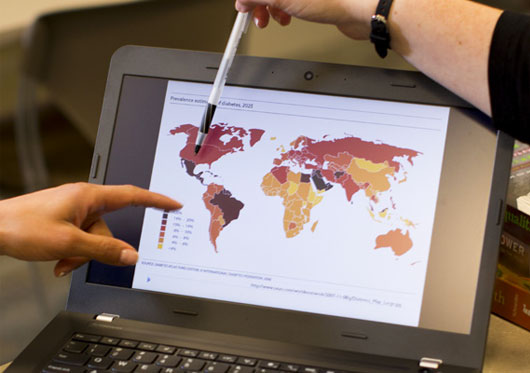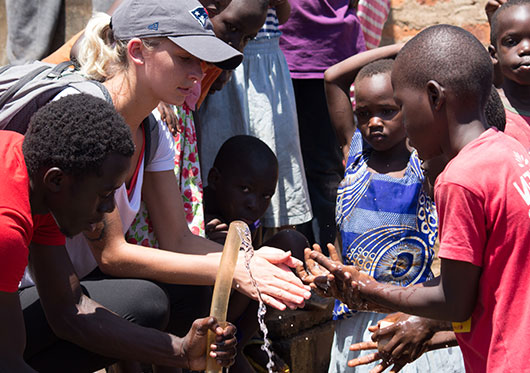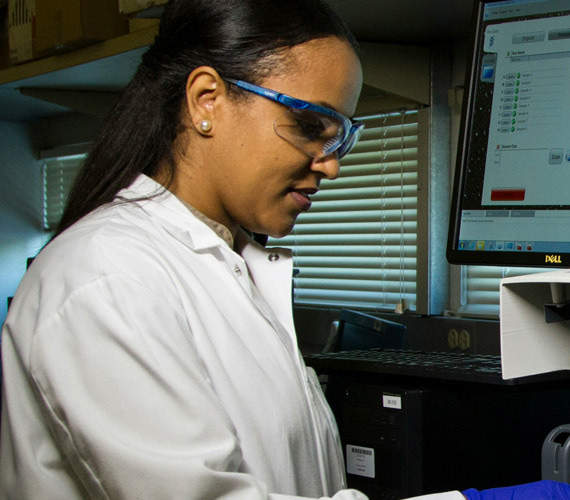Public health is a rewarding career that offers stability, growth, and countless opportunities to make a difference in others' lives. The work that public health professionals do to educate populations, promote health and wellness, and inform policy is an essential aspect of the healthcare system that has a tremendous, and often immediate, impact on the communities they serve.
For many professionals pursuing a career in public health, a major factor underlying this decision is a passion for helping those in need.
“For me, the most rewarding part is actually having a direct impact in the community,” says Dr. Richard Pulice, professor for Regis College’s public health programs. “The work of public health has a direct and often immediate impact. Say you’re involved in a disease outbreak or a water project—you get to see the results of these things fairly quickly and that's often rewarding.”
What is a public health degree?
Public health degrees focus on educating students on how to improve community health and well-being through programs and research. Graduates can pursue careers in fields like epidemiology, health education, administration, and environmental health.
No matter what field you choose, public health professionals are vital in addressing health inequalities, policies, and community health education. Their work contributes to public health initiatives like vaccinations, food safety, and clean water policies, which have historically increased life expectancy and improved the quality of life for populations worldwide.
It’s individuals with an interest in these topics that should consider public health as a good major to pursue.
For those hoping to break into the field or take the next step in their public health career, pursuing a bachelor’s degree is one way to develop the skills and experience needed to unlock opportunities for career growth.
What can you do with a public health degree?
If you're considering earning a bachelor’s degree in public health, one of the biggest questions you’re likely asking yourself is: What can I actually do with this degree?
According to Dr. Leslie Mandel, associate professor and director of Regis College’s public health program, “You’re not limited with public health.”
Here’s a look at the top careers available to public health professionals with a bachelor’s degree, as well as average salaries and career outlook for the field.
Top Public Health Careers
Students who complete their bachelor’s degree in public health have a wide variety of career options available across different work settings.
According to our analysis of job postings data, the top industries hiring public health degree holders include:
- Colleges, Universities, and Professional Schools
- General Medical and Surgical Hospitals
- Other General Government Support
- Direct Health and Medical Insurance Carriers
- Offices of Physicians (except Mental Health Specialists)
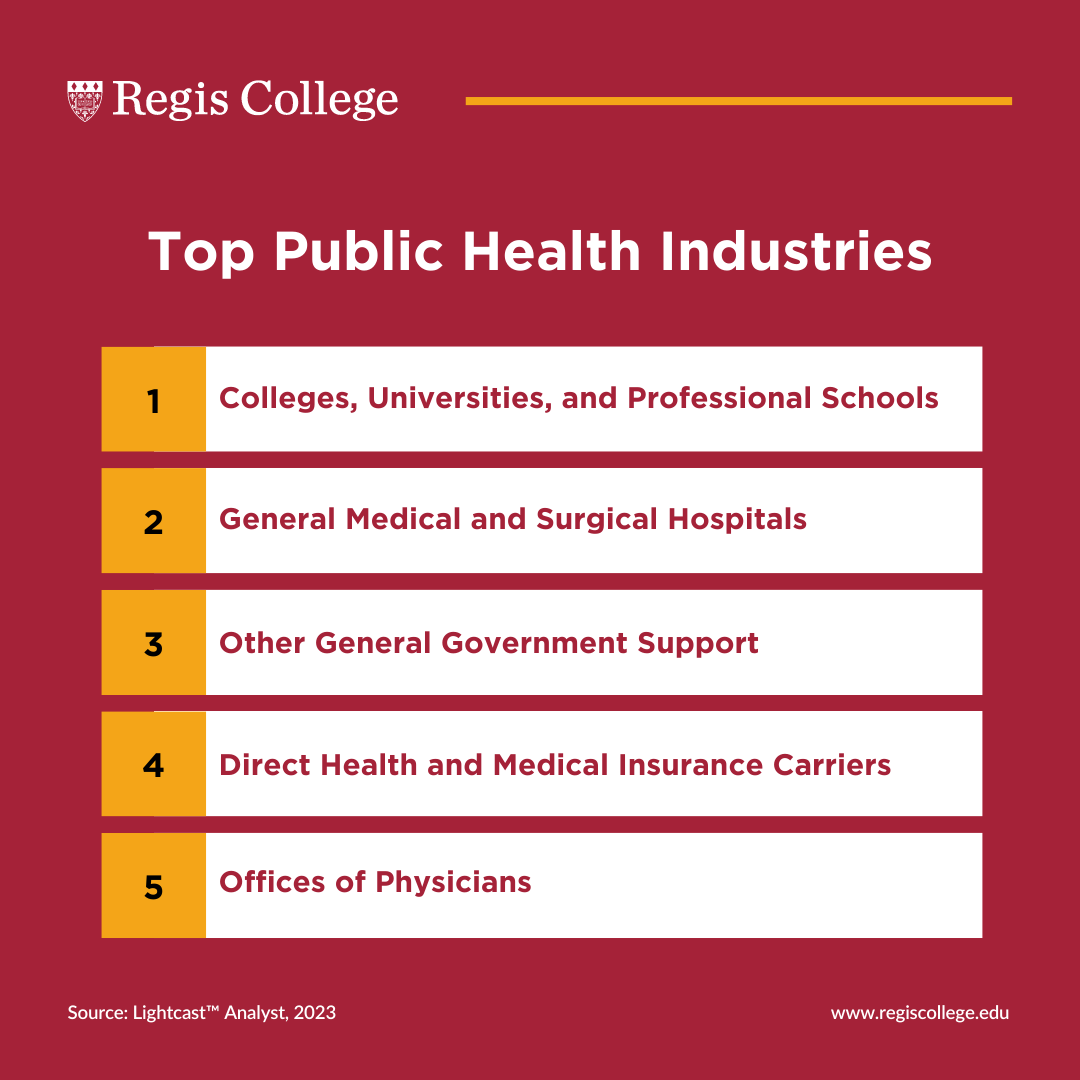
It’s important to note that the job opportunities available to public health professionals often depend on geographic location. If you’re interested in working somewhere there’s abundant opportunities for public health professionals, here are the top U.S. cities hiring graduates of bachelor’s-level public health programs, according to our analysis of job postings data:
- New York, N.Y.
- Boston, Mass.
- Washington, D.C.
- Atlanta, Ga.
- Chicago, Ill.
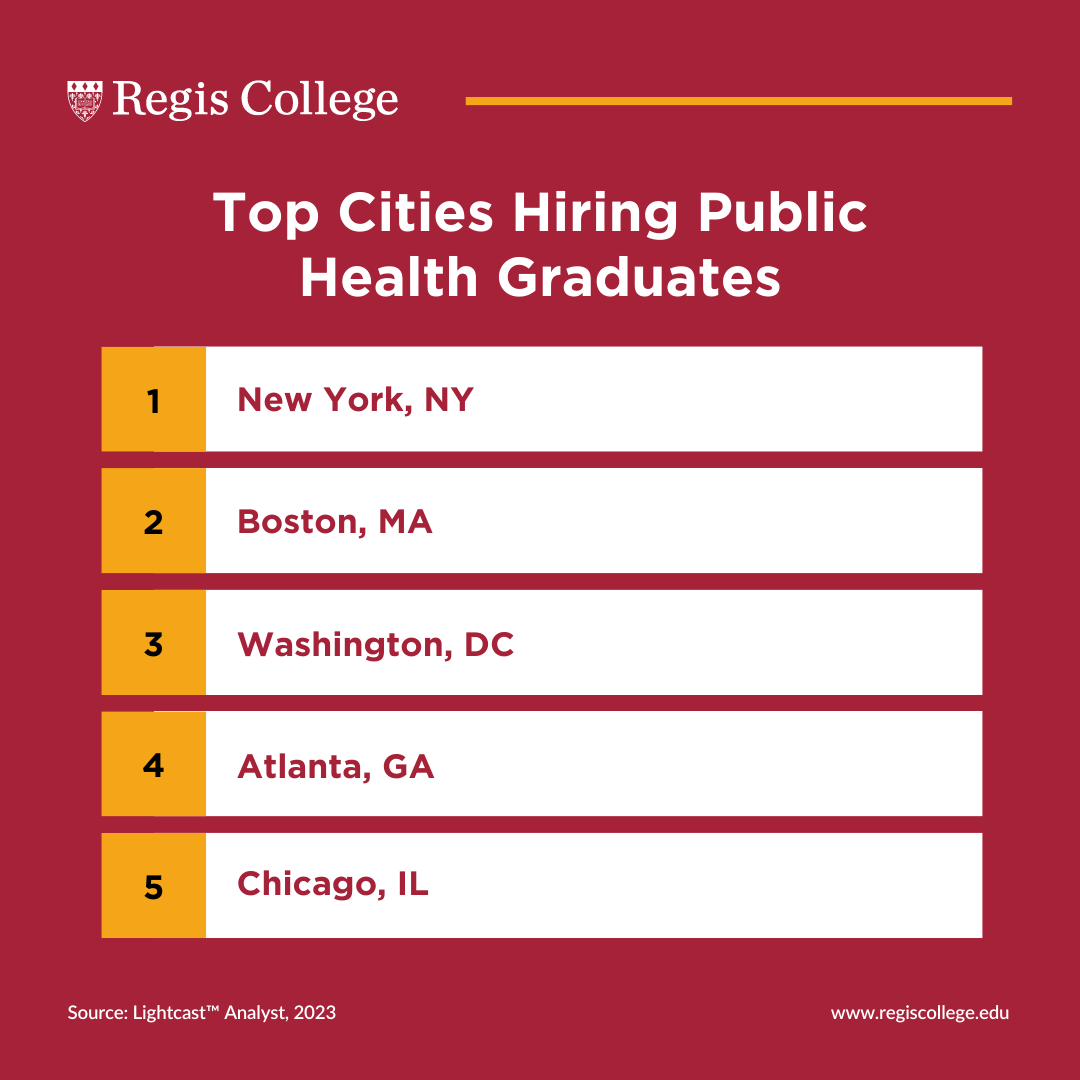
However, each location might have different job opportunities depending on demand and the communities’ needs. For example, some of the top public health careers in the Merrimack Valley include health educators, community health coordinators, and public health advisors.
According to our analysis of job postings, a bachelor’s in public health provides the fundamentals for the following positions:
- Community Health Worker: $47,500 per year
- Environmental Sanitarian: $47,500 per year
- Health Educator: $50,600 per year
- Public Health Investigator: $53,400 per year
- Environmental Specialist: $59,800 per year
- Public Health Researcher: $79,800 per year
- Public Health Advisor: $88,400 per year
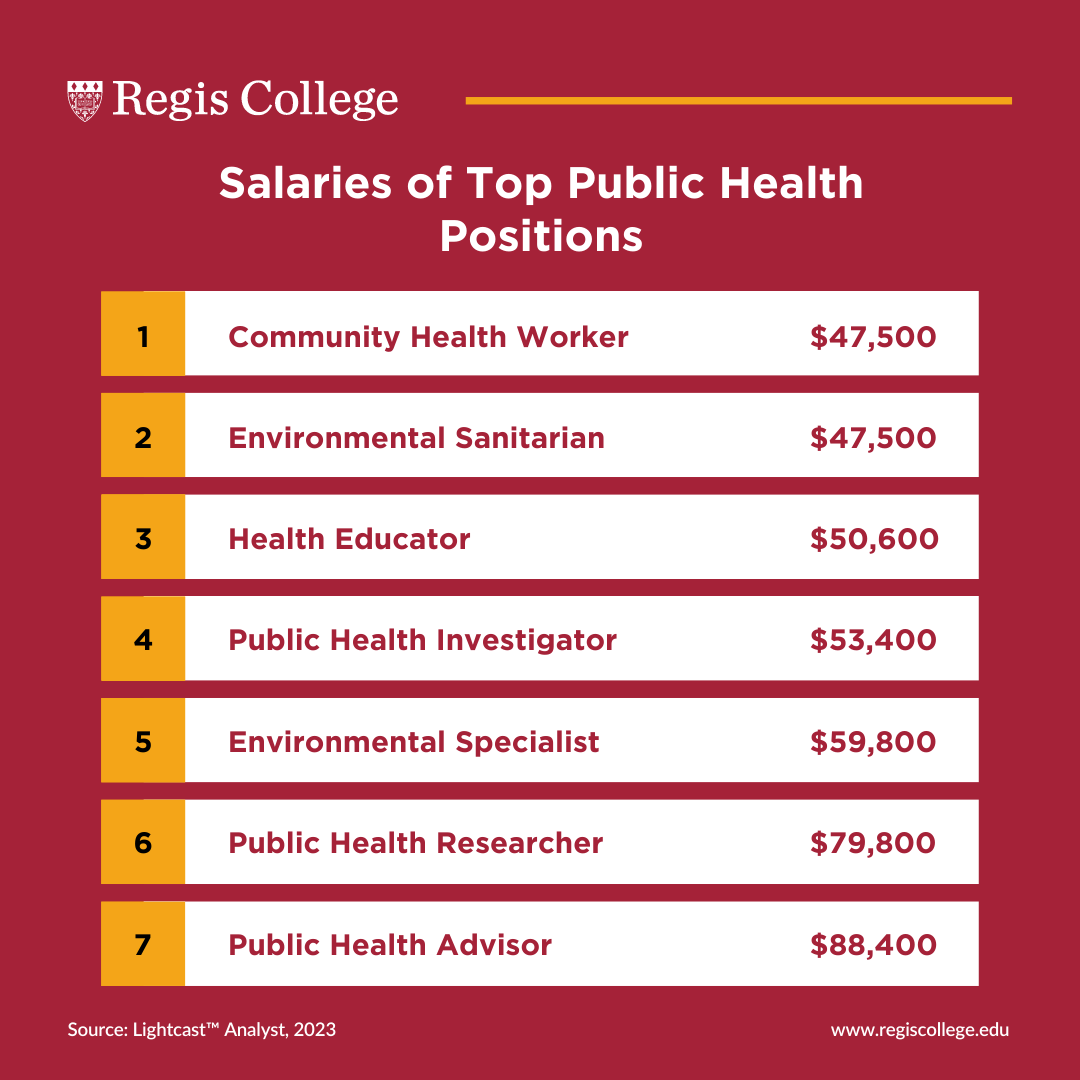
Here’s an overview of these popular job titles for bachelor’s degree holders in public health.
1. Community Health Worker
Community health workers serve as intermediaries between the community and health/social services. They perform a variety of functions such as:
- Educating community members about healthcare access
- Collecting data
- Conducting community outreach
Since community health workers support others through advocacy and occasional informal counseling, this role requires strong empathy and communication skills. This position typically requires at least a high school diploma or associate's degree.
2. Environmental Sanitarian
Environmental sanitarians work to improve health and safety within an environment by:
- Identifying public health risks
- Routinely examining businesses to determine whether they are complying with health standards
- Enforcing health and safety regulations
They typically work in settings like businesses, hospitals, restaurants, and the general environment.
3. Health Educator
Health educators work to educate community members about healthy behaviors and healthcare access in an effort to improve overall health outcomes. Health educators work in healthcare facilities, schools and colleges, non-profit organizations, and other settings.
4. Public Health Investigator
Public health investigators observe the severity of illnesses caused by chronic and acute conditions. They do so by:
- Identifying cases of communicable disease
- Tracing transmissions
- Providing prevention education
Their work often involves interviewing patients and gathering data to evaluate the spread of disease within the community, especially during outbreaks.
5. Environmental Specialist
Similar to environmental sanitarians, environmental specialists seek to understand the unique ways in which the environment impacts human health. They leverage this understanding to improve the health of the community by working to address environmental concerns such as waste management and pollution.
6. Public Health Researcher
Public health researchers conduct research surrounding various public health trends, risk factors, solutions, and so on. This research is often used by other public health professionals and healthcare providers, and to inform public health policy.
7. Public Health Advisor
Public health advisors are responsible for assisting in the development of public health programs to improve overall community health and well-being. This involves:
- Collecting relevant health data
- Interpreting the collected data
- Presenting data to inform policies and public health programs
In addition to developing programs, public health advisors often provide guidance to an organization and those that it serves.
Public Health Salaries
According to our analysis of job postings data, professionals who hold a bachelor’s in public health make a median annual salary of $68,500, and this number is increasing at an annual rate of 27 percent. However, this can vary depending on position, experience, and even geographic location.
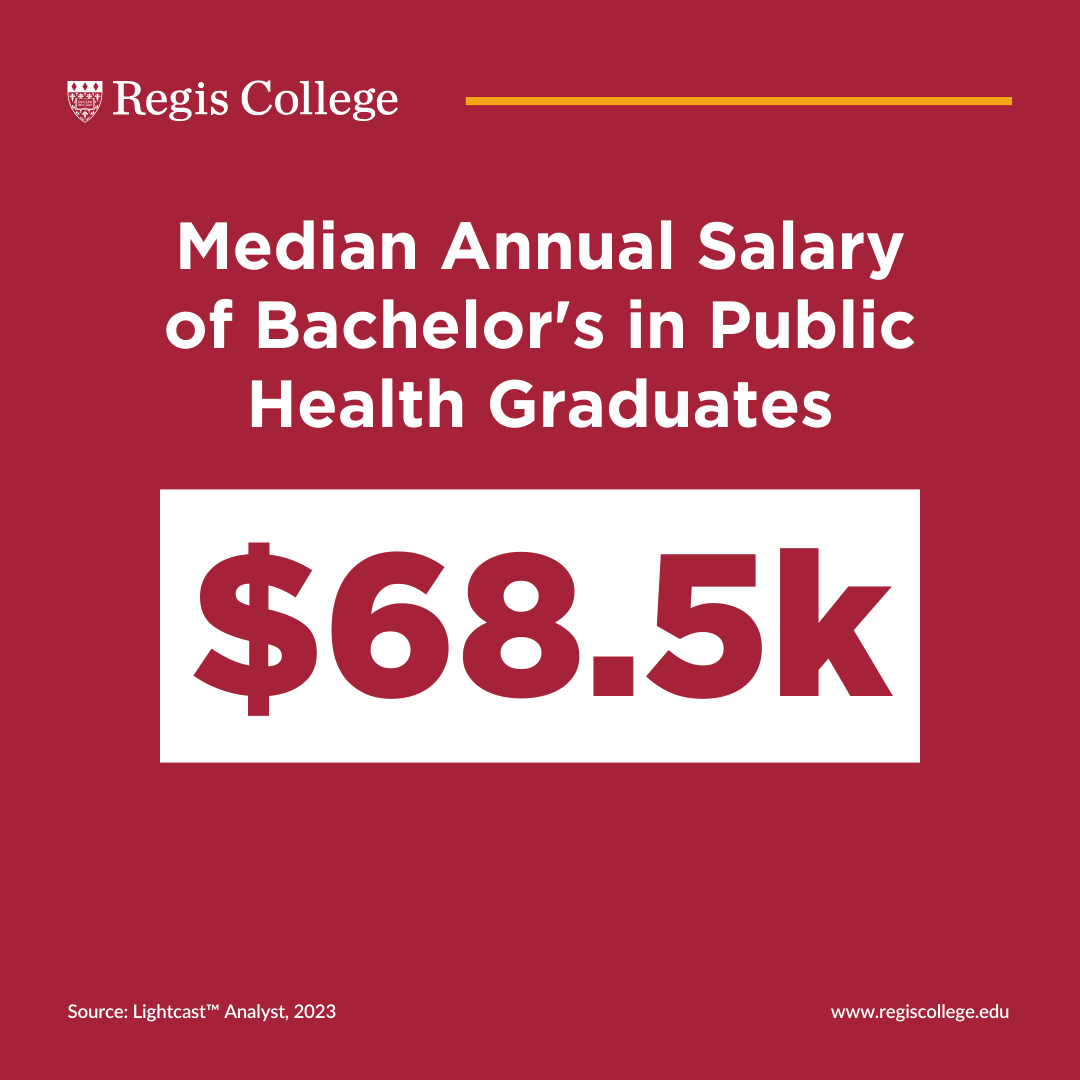
Keep in mind that your earnings can also vary based on your location. However, it’s important to remember that different locations have different costs of living as well. Therefore, it’s not always recommended to apply for a job just for a higher salary. Instead, try to factor in living expenses when job hunting.
If you already have an associate's degree in public health or a related field, completing your bachelor’s degree can allow you to seek more advanced positions with increased earning potential.
Additionally, a bachelor’s degree can act as a stepping stone to a master’s in public health (MPH), which is often required for the most advanced positions in the field.
Public Health Career Outlook
Public health is a quickly growing field that’s trying to meet the rising healthcare needs of communities and populations throughout the country. In fact, employment of community health workers and health educators—two popular careers in the field—is expected to grow seven percent from 2021 to 2031—more than twice as fast as the average growth for all occupations.
Major events—like the coronavirus (COVID-19) pandemic—have also underscored key public health issues and have contributed to the increased demand for skilled public health professionals.
Healthcare is continuously evolving and adapting to support the needs of communities. It’s difficult to predict what healthcare challenges the public will face in the future, but there will always be a need for public health professionals.
Is a bachelor’s in public health right for you?
Public health is a promising and rewarding career choice for many. To help you decide if earning a bachelor’s in public health is right for you, consider your personal and professional goals and evaluate how completing your degree will help you achieve those goals. If you do choose to further your education, it’s also important to find a program that fits your unique needs and will support you in pursuit of those goals.
Regis College, for example, offers flexible programs including a degree completion program which allows students to convert their existing associate's degree into a bachelor’s in public health. Regis’ public health programs are also focused on hands-on learning and real-world experience to give students the skills they need to be successful in the field.
In addition to field experience, industry-aligned faculty—many of whom are active in the field—bring their unique knowledge to the classroom everyday and share the experiences they’ve had throughout their careers with students.
If you're ready to take the next steps in your public health career, consider Regis College’s Bachelor of Arts in Public Health. This program will equip you with the skills and knowledge you need to become a leader in the public health field.


